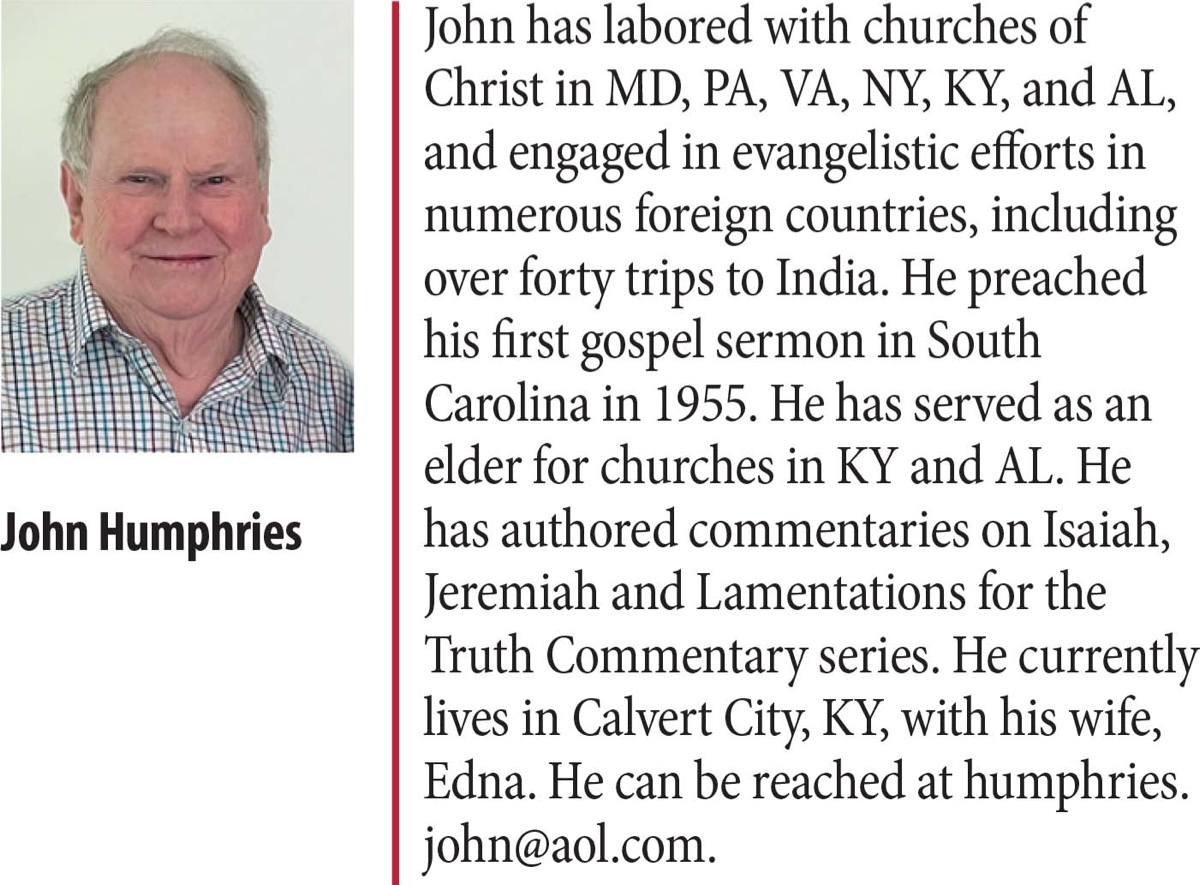
by John Humphries
Synopsis: Men who dedicate their lives to preaching the gospel face challenges at each stage of development. With increasing maturity comes increased responsibility, and also additional opportunities to promote the truth and help others.
Some experienced preachers will make few moves in their preaching efforts. They will remain with a congregation for many years before they move to another work. Some may remain with a congregation until old age. Others may move every four or five years. One preacher (now departed) made the comment that a preacher may remain with a congregation until he “gives satisfaction”—and this may mean different things under different circumstances! If the preacher stays long enough to learn of various issues that need addressing, and deals with these in his lessons, his days may be numbered unless the brethren are spiritual enough to accept the truth and make the needful corrections. There may be problems with divorce and remarriage, worldliness, unscriptural ideas being sneaked in among the brethren, etc. Dealing with these can unsettle some brethren that reject the truth (Gal. 4:16).
Of course, some preachers just like to move to different places and work with a different group of brethren. Yet, the main thing is that the mature preacher is always seeking to please the Lord and help the brethren in their spiritual growth. There is also the hope and prayer that wherever he is laboring, the church will grow numerically as well as spiritually.
There may be some that have sermons for about four or five years, and will allow that to be a motivating factor to some extent in moving. The following conversation allegedly took place between two preachers some years ago. The one was telling the other (they had known each other for years) that he had twenty years of experience in preaching. The other said to him, “No, you only have four years of experience five times because you move every four years when you run through your sermons!” They both had a laugh, so perhaps this was all in good humor. However, then there is the old tale that over a dozen preachers in the Ohio Valley, several years ago, withdrew their announcement that they were going to move when Leroy Brownlow published a new sermon outline book. These may all be apocryphal tidbits. Yet, it may also hit a nerve with some that do not study as they should and prepare their own lessons, and also improve the old outlines. They preach a lot of what used to be called “canned sermons.” Of course, preachers today would never be guilty in this area!
This suggests that even though one has a load of sermon outlines, after preaching for twenty or thirty years, there is the need to continue diligent personal study of the Scriptures and thus gaining more and deeper insight into the Word of God. This means revising, where needful, the old outlines where they may lack in depth. Preachers ought to be serious Bible students all of their lives.
Just as with younger preachers, mature preachers need to meet regularly with the elders (should the church have them). This helps the gospel preacher to keep abreast of any spiritual needs that should be addressed in sermons, Bible class lessons, or personal visits. There is always the need to preach what is needed, to whom it is needed, and when it is needed. The elders can help in this important consideration in preaching timely gospel lessons.
Most preaching today is topical. Verses that relate to a particular subject are assembled and presented in an orderly and edifying fashion. Topical preaching is certainly needed to keep the brethren informed concerning the challenges of life and also growing in the grace and knowledge of the Lord and Savior Jesus Christ (2 Pet. 3:18). Issues may arise that need to be specifically addressed by a faithful gospel preacher.
Over the years, many distortions of the truth have appeared and divided churches across the land. In the past century, the problem of premillennialism had to be addressed by faithful brethren. The problem of institutionalism and related issues have divided churches. Many other issues, some of them more sectional than others, have caused problems in various churches. The devil is always busy looking for opportunities to trouble God’s people. We do not intend to offer a history of these problems or issues—except to note that they are many! Rather, our point is that the mature preacher and a wise eldership must keep alert, study the Scriptures, and address any issue before it causes problems in the local church (Titus 1:9; Acts 20:26-29; 2 Tim. 1:13; 4:5). Topical preaching, therefore, needs to be timely and helpful in building a strong, sound church.
Besides preaching on a particular subject, the gospel preacher should seriously consider expository preaching. Many years ago, several older and gifted gospel preachers informed this writer that an evangelist should preach through a book of the Bible on a verse-by-verse basis now and then. This is expository preaching. This acquaints the brethren with individual books of the Bible and certainly will place a verse in its proper context. Verses that are used as a “proof text” are sometimes taken out of context and do not really deal with the point being made in a topical lesson. The wording of the verse seems to fit the subject being presented, and is thus used in the lesson. The preacher, indeed, may be teaching the truth in his sermon, but if the passage on which he is basing his argument actually deals with a different matter, he is guilty of quoting or reading it “out of context.” Expository preaching through a section of Scripture keeps a preacher from making this mistake. So, it is a good practice to preach through a book of the Bible occasionally.
In the life of a gospel preacher, should he have a family, he will eventually have college-age children. Educational costs are high and can place a real strain on the budget. It is certainly in order for the wise family to be putting aside a college fund long before the children reach that age. This calls for financial discipline that should begin at least at the beginning of the marriage. This is not always easy to do, but preachers must do their best to set funds aside, though it may be a little each month at first. Teenagers, where appropriate, may also need to get part-time work and put aside funds for their education.
There are gifted preachers today that receive many invitations to “hold a gospel meeting” for the brethren. These men do a great job in presenting the gospel, and thus are very popular among the brethren. Yet, these experienced, mature gospel preachers have important responsibilities regarding the local church where they preach, and also family responsibilities. Thus, there is the need to balance all of this with the local church and with the needs of their own family. Some preachers have later expressed regret (because of family problems) that they were “gone too much” and neglected their families, to their detriment. If their schedule is full, wise gospel preachers will learn when to say “no” or “perhaps later” to such invitations. Often there is an agreement between the preacher and the elders or brethren regarding how many meetings he can arrange each year. His family needs to be in on this decision as well.
While Sacred Scripture does not specifically say that Samuel was doing wrong, the text is clear that he was “busy here and there” (1 Kings 20:40) doing the Lord’s work,[ but was told, “your sons do not walk in your ways” (1 Sam. 7:15-8:5). This resulted in problems for God’s people (1 Sam. 8:7, 18). Preachers must not neglect their family responsibilities, since their wives and children, receiving proper attention, are also “the Lord’s work”[ and must be taken seriously (Eph. 6:4; Col. 3:21). Even when the children are older, they still need their father’s presence and counsel, perhaps even more than ever!
A middle-aged preacher may also be called upon to assume the responsibility of being an elder. The Bible certainly authorizes an elder to “labor in the word and doctrine” and receive “double honor” (i.e., financial support or wages) (1 Tim. 5:17-18). If a man possesses the spiritual maturity and godly character that the qualifications require in one, this should present no problems for mature brethren (1 Tim. 3:1-7; Titus 1:5-9; Acts 20:17-35; 1 Pet. 5:1-4; Eph. 4:11-16; Acts 11:30; 15:6). An elder that also preaches the gospel with a local church (meeting the qualifications referenced) will not abuse his opportunities in the pulpit in some inappropriate way. If he were to do such, he would disqualify himself as being worthy to preach or to be an elder! Many mature preachers serve as elders across the land today, and are doing an outstanding job of edifying the church and glorifying God. In some smaller churches, there could not even be an eldership if the preacher (assuming that he is qualified) did not serve.
Should financial considerations present themselves when the annual budget is under review, the wise elder that is doing the preaching might consider excusing himself from that part of the budget dealing with his support. Some elderships ask the evangelist concerning his budgetary needs and then he is excused, while the matter is discussed and decided. Of course, if there are only two elders (including the preacher) then the other elder needs to get the sentiment of mature brethren, and then the eldership can come to an agreement. Of course, there may be other ways that a wise eldership can work this out. What is offered here is only a suggestion.
Some preachers are gifted with the ability to present the gospel by radio, television, or other forms of mass media. Many people, over the years, have learned the truth and have responded to the gospel through truth being presented on the radio, television, or the internet. Gospel preachers should be prepared to take advantage of such opportunities should they become available. Radio and TV air time can be very expensive and beyond the budget of the church. There are also less costly avenues on the internet that offer opportunities for the gospel preacher: Zoom, Microsoft Teams, Google Duo, Skype, etc. Gospel preachers employ these tools to make overseas calls and conduct studies with brethren and prospects regularly. Some of these programs can have multiple hook ups with teacher and students at home and abroad.
Those with the ability to write should use that talent to the glory of the Lord and the edification of others. There are periodicals that will use well-written articles that glorify the Lord and edify all who read them. The writer obviously needs to write something that is timely and useful. The article or paper must be well researched and accurate. It must be true to the Word of God and correct concerning any facts and details under consideration. To misrepresent or be inaccurate concerning an issue or an individual’s position does more harm than good. All need to write to be clearly understood, but also need to write and avoid being misunderstood. Good writers also are wise to have someone (with a good understanding of grammar) edit their article, etc. Editors can spot confusing sentences, flawed logic, wrong punctuation, incorrect references, etc. and thus help prevent the article or paper from being a disaster. Do not be too proud to ask for such help!
Mature preachers should give some thought to 2 Timothy 2:2 regarding young preachers that desire to learn, receive advice, or gain experience. If the church has the financial resources, it is a good work to have a young man (even with wife and children) come and work with an older, mature preacher and the congregation for a set period—or even for an indefinite time. Some churches have helped numerous young preachers gain experience and grow spiritually. This calls for careful thought and planning in order for there to be a truly helpful experience for the young preacher. His duties and responsibilities must be clearly defined and agreed to by all involved. The older, mature preacher must give this earnest prayer and careful thought, along with the elders and brethren, as to his role in helping to train the young evangelist. This experience can be a major factor in the prospective preacher’s attitude and development as he goes forth to preach the gospel.
If the church cannot afford to support an additional evangelist, then the older, mature preacher ought to make himself available to help the young men to go grow spiritually and in their knowledge and understanding of the Bible. This means having a class for preachers (open to all) where studies in the Scriptures take place. Over the years, this writer has taken part in such classes with dozens of preachers—wherein we studied much of the Bible, as well as special timely topics, such as dispensationalism.
There have been many times when a mature preacher has sat with a younger man, answering his Bible questions, and helping him work through problems that he has faced [ [in preaching the gospel. Most of the issues and questions that were discussed were those that the mature preacher had faced in bygone years. Valuable experience and insight can be shared with a younger preacher that may not only save him much frustration, but also prevent his dismissal where he preaches. Such sessions can be very uplifting and valuable for a young man—helping him avoid serious pitfalls and perils.
The middle-aged preacher is at an age where his maturity and knowledge should be well in evidence—that is, if he has applied himself in study, prayer, and diligent, faithful service through the years. By this time, he ought to be aware of the talents that the Lord has given him and is ready to use them for the glory of his Lord and Master: “For of Him and through Him and to Him are all things, to whom be glory forever. Amen” (Rom. 11:36). Let us, therefore, manifest the attitude of Isaiah, who said, “Here am I, send me” (Isa. 6:8). 



